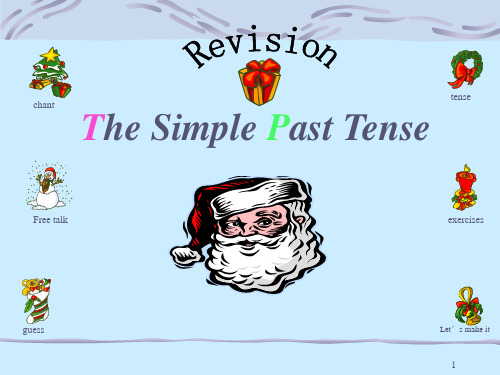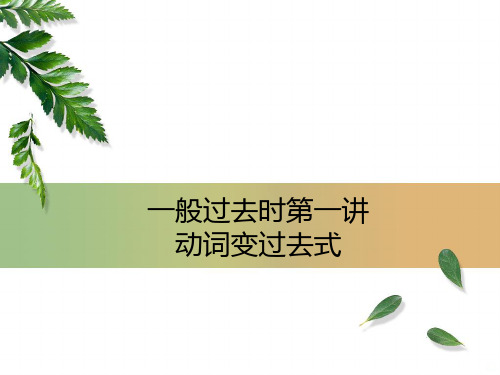一般过去时讲解及练习课件
一般过去时(7张PPT)初中英语专项复习课件

易错点:
稿定PPT
(1)表示一系列的动作,尽管有先后,都稿用定一PP般T过,去海时量,素最材后持两续个动词之间用and连结。 He opened the door, rushed out and then disa更 总pp新 有ea, 一red上 款. 他千 适打款 合开模 你门板,选冲择了出去,然后就消失了。 (2)注意在语境中理解"我刚才/原来还不……"。
感谢观看
一般过去时 初中英语专项复习
一般过去时 构成:一般过去时用动词的过去式构成,其规则动词变化方法如下表所示:的状态。
情况 一般情况 以不发音的字母e结尾
以辅音字母 +y结尾
结尾只有一个辅音字母的重 读闭音节
构成方法
例词
加-ed
wash→washed help→helped
稿加定-PdPT
hope→hoped like→liked
一般过去时 (5)一般过去时有时可以表示现在,多与 want, hope, wonder, think, intend 等动词连用,使语气更委婉 。
I wondered if you could help me. 不知你能不能帮我一下。 有时用一般过去时也是时态一致的需要。 I didn’t know you were here. 我不知道你在这里。
He was here just now. 他刚才还在这里。 What did you do yesterday? 你昨天做了什么事?
(2)在过去一段时间内的经常性或习惯性稿动定作PP。T 稿定PPT,海量素材持续
We often played together when we were child更re新n.,我上们千小款时模候板常选在择一起玩。 总有一款适合你
一般过去时PPT获奖课件

Just now 刚刚 Last week 上周 in the past 过去 that day 那天 last year 去年 that year 那年 that month 那个月 just now 刚刚
一般过去时态句式旳构成
陈说句式
动词
肯定式
否定式
I was ….
I was not(wasn’t)….
订正答案 返回练习
一般过去时态练习
把下列句子改成相应时态
1. He usually gets up early in the morning.
But he
got up
late today.
2. She usually works from 8 a.m. to 5 p.m.
But yesterday she worked from 8 a.m. to 6 p.m.
3. stop 6. trip 9. want 12.have e 18.put 21.read
订正答案 返回上页
动词过去式转换练习
答案
1. look looked 4. carry carried 7. call called 10.are were 13.do did 16.say said 19.eat ate
did not(didn’t) work.
There was …. there There were…. be
There was not (wasn’t) …. There were not (weren’t)…问句式
动词
疑问句式和简略答语
第一人称
第二人称
be He /She/it was….
He/She/It was not(wasn’t)….
小学英语一般过去时态讲解及习题ppt课件

A: What day_i_s_ it today ? B: It _is_ Sunday. A: What day _w_a_s_it yesterday?B: It_w_a_s_Saturday. A: What day _w_a_s_ it the day before yesterday ?
39
It was sunny.
The vacations were great .
How was the weather ? How were the vacations ?
I did my homework yesterday.
What did you …do…?
She played soccer last Sunday.
Did they have…?
My father went to the beach three years ago.
Did your father go…?
Tom and Jack studied for the test three days
ago. Did Tom and Jack study…?
I did my homework yesterday.
Did you do…?
Sshe play…?
He cleaned his room last week.
Did he clean…?
They had a summer camp last weekend.
What did she …do…?
30
Exercise 1. _W_e_r_e_(be) you busy yesterday afternoon? 2. She _w__a_s _ (be) at school this morning. 3. Jane and Ann w__er_e_n_’(tbe not) friends before. 4. He _d_i_d_n_’(tdo not) live in Guangzhou
一般过去时(12张PPT)初中英语专项复习课件

一般过去时 初中英语专项分析
一般现在时 de 应用场景
过
动作行为
去
发
生
曾经
的
存在的状态
识别 标志词 理解 句意
答题技巧
熟练 动词 转换
yesterday last week 3 days ago
动词 过去式
熟练 句型 转换
肯定 否定 疑问
一般 过去时 He played basketball yesterday.
yesterday? Yes, I did. No, I didn’t.
动词 过去式 形态的变化
一般
直接加 ed
二般
以 e 结尾,去 e 加 ed live dance hope use
动词 过去式 形态的变化
三般
重读辅元辅,双写尾字母
stop plan
四般
辅音字母 + y 结尾,把 y 变 i 加 ed cry study worry
标志词
时间状语:last night, yesterday, the day before yesterday last week, some years ago in 1995, the other day, just now, in the past
小学英语时态之 一般过去时讲解课件ppt

一般过去时:
定义: 一般过去时,是表示过去某一时刻或某一段时间内发生的动作或存在
的状态。
标志词: yesterday, just now, …ago, last…, this morning …
结构: 谓语是be动词
谓语是行为动词
肯定句: 主语+ was/were + 其他 否定句: 主语+ was/were + not + 其他 一般疑问句: Was/Were + 主语+其他? 肯定句: 主语+ 动词的过去式 + 其他 否定句: 主语+ didn’t +动词原形 + 其他 一般疑问句:Did + 主语+ 动词原形 +其他?
at the weekends this morning often
usually
last Mid-Autumn Festival
every day three days ago on Mondays
tomorrow a moment ago 14 years ago
找出表示一般过去时的时间副词。
( B) 1. My mother had breakfast and____to work.
A. go B. went C. going D. to go
( A)2. -- How __ your vacation?
-- It was pretty good. A. was B. were C. did D. do
( )3.Each student one picture.
A.draw B. draws C. drawing D.to drawing
英语一般过去时PPT课件

live hope use
lived hoped used
6
3.重读闭音节词, 先双写这个辅音字母,再加—ed
stop plan
stopped planned
7Байду номын сангаас
4. 以“辅音字母+y”结尾的词, 先变“y”为“i”再加—ed
study worry
studied wd orrie
8
不规则动词 过去式的构成
was were did
went had made got
eat
say see stand find
ate
said saw stood found
18
Play Played
19
use used
20
plan planned
21
study studied
22
worry worried
23
stop stopped
一般过去时第一讲 动词变过去式
past no w
futur e
2
动词过去式 的构成
规则动词
regular verbs
不规则动词
irregular verbs
3
规则动词 过去式的构成
1、一般在动词末尾加– ed
look play start
looked played started
5
2、结尾是 e 的动词只加 -- d
否定句: →She didn’t play the violin last night.
肯定句: They swam in the lake yesterday.
否定句: →They didn’t swim in the lake yesterday.
一般过去时(课件)
一般过去时(课件)一般过去时是英语中表达过去某个时间点或时间段发生的动作或状态的一种时态。
在一般过去时中,动词的形式需要根据主语的人称和数进行变化。
一般过去时的句型结构是:主语 + 动词过去式 + 其他。
一、一般过去时的构成1. 规则动词:在动词原形的基础上加上ed。
例如:work → worked, play → played, study → studied。
二、一般过去时的用法1. 表示过去某个时间点发生的动作。
例如:I went to the library yesterday.2. 表示过去某个时间段内发生的动作。
例如:We playedfootball last weekend.3. 表示过去某个时间段内的状态。
例如:She lived in New York for five years.4. 表示过去习惯性动作。
例如:He used to smoke when he was young.三、一般过去时的疑问句和否定句1. 疑问句:将助动词did放在主语之前,动词原形放在助动词之后。
例如:Did you watch the movie last night?2. 否定句:在主语和动词之间加上助动词did,动词原形变成动词的过去式,并在动词过去式前加上not。
例如:I didn't finish my homework yesterday.四、一般过去时的特殊用法1. 过去进行时:表示过去某个时间点正在进行的动作。
例如:What were you doing at 8 o'clock last night?2. 过去完成时:表示在过去某个时间点之前已经完成的动作。
例如:I had finished my work before he came.3. 过去完成进行时:表示在过去某个时间点之前一直在进行的动作。
例如:She had been waiting for two hours when he finally arrived.一般过去时(课件)一般过去时是英语中表达过去某个时间点或时间段发生的动作或状态的一种时态。
一般过去时讲解课件(共19张PPT).ppt
否定句
1) 主语+wasn’t/weren’t+表语
He wasn’t a student ten years ago.
2) 主语+didn’t+动词原形+其他
They didn’t have a good time last night.
4.一般过去时的结构
一般疑问句
was为单数; were为复数
一般过去时的结构
4.一般过去时的结构
was为单数; were为复数
肯定句
1) 主语+was/were+表语
He was a student ten years ago.
2) 主语+动词过去式+其他
They had a good time last night.
4.一般过去时的结构
was为单数; were为复数
时间+ago类 in+年份类
yesterday morning;yesterday.... last night; last week...
two days ago in 2023
动词过去式的变化
3.动词过去式的变化 1.直接加ed work--worked look--looked 2.不发音的e结尾,去e加ed hope--hoped like--liked 3.重读的闭音节词,双协结尾字母加ed stop--stopped plan--planned 4.以辅音字母加y结尾,变y为i再加ed study--studied try--tried 5.不规则变化
What did they do last night?
总结与练习
5.总结与练习
一般过去时 1.定义:表示一个过去发生的动作或表示过去存在的状 态 2.标志词:yesterday,last...,....ago, just now..... 3.动词的过去式变化 4.一般过去时的各种句型:
一般过去时(公开课)课件
表示过去的经验、观察、想法 或情感。
用于描述历史事件或故事,强 调其发生的时间和背景。
02
一般过去时的动词变 化
规则动词的一般过去时变化
01
规则动词的过去时形式通常是在 动词原形后面加-ed,例如: play-played,write-wrote。
02
有些规则动词的过去时形式有音 形的变化,例如:write-wrote, buy-bought,run-ran。
表达过去的经验或习惯
一般过去时也可以用来表达过去的经验或习惯,例如“他以前是一 名教师”表示过去的经验。
描述历史事件
在描述历史事件时,一般过去时也是常用的时态,例如“二战期间 ,德国侵略了许多国家”。
表示过去的推测或假设
表达对过去的推测
一般过去时可以用来表达对过去的推 测,例如“如果当时听了医生的话, 现在可能已经康复了”表示对过去的 推测。
一般过去时(公开课)课件
汇报人:可编辑 2023-12-22
目录
• 一般过去时的定义 • 一般过去时的动词变化 • 一般过去时的句型结构 • 一般过去时的时态意义 • 一般过去时的实际应用
01
一般过去时的定义
什么是一般过去时
描述过去发生的动作 或状态。
用于回忆、描述历史 事件或故事。
表示过去的经验、观 察、想法或情感。
过去完成时
主语+had+动词过去分词 +其他成分,表示过去某 个时间之前已经完成的动 作
过去将来时
主语+would/could+动 词原形+其他成分,表示 过去某个时间对未来的预 测或意愿
04
一般过去时的时态意 义
表示过去的动作或状态
一般过去时的讲解ppt课件完整版
助动词did的用法
在一般过去时中,助 动词“did”用于构 成疑问句和否定句。
在回答一般过去时的 疑问句时,可以用 “did”的相应形式 进行回答。
“did”后面跟动词 原形,表示过去某个 时间发生的动作或状 态。
一般过去时的否定句和疑问句
否定句
在动词前加“didn’t”,后面跟动词原形,表示过去某个时间没有发生的动 作或状态。例如:“I didn’t go to the park yesterday.”(昨天我没有去公 园。)
陈述句改疑问句
指导学生将一般过去时的 陈述句改写为疑问句,注 意语序的调整和助动词 did的使用。
特殊疑问句的回答
给出特殊疑问句及其回答 ,让学生熟悉一般过去时 特殊疑问句的构成和回答 方式。
阅读理解中一般过去时的识别与运用
阅读文章并回答问题
提供一篇含有一般过去时的文章,让学生阅读后回答与文章内容 相关的问题。
疑问句
将助动词“did”放在主语前构成疑问句,表示询问过去某个时间是否发生了某 个动作或状态。例如:“Did you go to the park yesterday?”(昨天你去公 园了吗?)
04
一般过去时的重点与难点
BIG DATA EMPOWERS TO CREATE A NEW
ERA
不规则动词的过去式
识别一般过去时的标志词
列出一般过去时的常见标志词,如yesterday, last week等,让学 生在阅读过程中识别并标注出来。
运用一般过去时描述事件
要求学生运用一般过去时描述一个发生在过去的事件,注意动词过 去式的正确使用和句子结构的完整性。
THANKS
感谢观看
1 2
- 1、下载文档前请自行甄别文档内容的完整性,平台不提供额外的编辑、内容补充、找答案等附加服务。
- 2、"仅部分预览"的文档,不可在线预览部分如存在完整性等问题,可反馈申请退款(可完整预览的文档不适用该条件!)。
- 3、如文档侵犯您的权益,请联系客服反馈,我们会尽快为您处理(人工客服工作时间:9:00-18:30)。
一般过去时句中谓语动词是实意动 词的时候,变成否定句和疑问句, 都要借助于助动词did, 否定句在助 动词did后面加not,疑问句用did来 提问 (注意:只要出现助动词,后 面动词一定要还原)例: She played computer last Sunday. She didn't play computer last Sunday. Did she play computer last Sunday?
目前我们学过的在句子中做谓语的动词有两类:
1.be动词 am, is was are were 2.实意动词除了be动词以外,都是实意动词。 我们平常用的那些动词,例如,eat ,look .teach.see.hear.等
☆助动词dodid
do有两个词性,一个是助动词,做助动词的时候 没有词义,只是协助动词。
一个是实意动词,表示“做”的意思,比如 do homework
否定句和疑问句
一般过去时句中谓语动词是be 动词的时候,否定句在be动词( 即:was或were)后加not,一般 疑问句把was或were调到句首。 例: It was hot yesterday. It wasn't hot yesterday. Was it hot yesterday?
清对清,浊对浊。元音后面还是浊,/t/、/d/后面发 /id/。其余后面常发浊。 1. 在轻辅音[p] [k] [f] [s] 等后加ed读轻辅音 /t/ : asked cooked worked looked talked picked helped surfed 2. 在浊辅音[b] [g] [v] [z] [m]等及元音后加ed读浊 辅音/d/ : lived listened closed opened watered 3. 在/t/ /d/ 之后读 /Id/ : add --- added need --- needed shout --shouted wait --- waited want ---wanted played
动词过去式转换练习
将下列动词变为过去式
1. look looked 4. carry carried 7. call called 10.are were 13.do did 16.say said 19.eat ate 2. live lived 3. stop stopped 5. hope hoped 6. trip tripped 8. finish finished 9. want wanted 11.go went 12.have had 14.get got e came 17.see saw 18.put put 20.take took 21.read read
2.它也可以用来表示在过去某段时间里经常 发生的习惯性动作。 My father often went to work by bus last year.When I was a child, I often listened to music.
一般过去时的句子里常常有一个意义 较具体的过去时间状语。 如:last night (week ,month , year , century , etc.) , yesterday , the day before yesterday , yesterday morning ( afternoon , evening ) , in 1999 , two hours ago ( one week ago , tree years ago , …)等等。
3. She was went to school last Monday. She went to school last Monday. 4. It wasn't did good. It wasn't good.
动词过去式转换练习
将下列动词变为过去式
1. look 4. carry 7. call 10.are 13.do 16.say 19.eat 2. live 5. hope 8. finish 11.go 14.get 17.see 20.take 3. stop 6. trip 9. want 12.have e 18.put 21.read
一般过去时
1.用来描述在过去某个时候发生的动作或存 在的状态。 例: He was here yesterday. I got up at six thirty yesterday morning. My father was at work yesterday afternoon. Did you have a good time last summer?
一般过去时谓语动词的变化: 1.be动词变成was或were 2.实意动词变成过去式: (1)一般情况下,动词词尾加 -ed ,如: work ---worked play---played want----wanted (2)以不发音的 -e 结尾动词,动词词尾加 -d,如: live---lived move----moved te---tasted hope---hoped (3)以辅音字母 + y结尾的动词,把-y变为-i 再加-ed, 如: study---studied copy---copied cry---cried carry---carried (4)以一个辅音字母结尾的重读闭音节动词,双写词尾 辅音字母,再加 -ed,如: stop ---stopped trip--tripped
1. I was played computer yesterday. I played computer yesterday. 2. They were baked bread in the kitchen last Sunday. They baked bread in the kitchen last Sunday.
